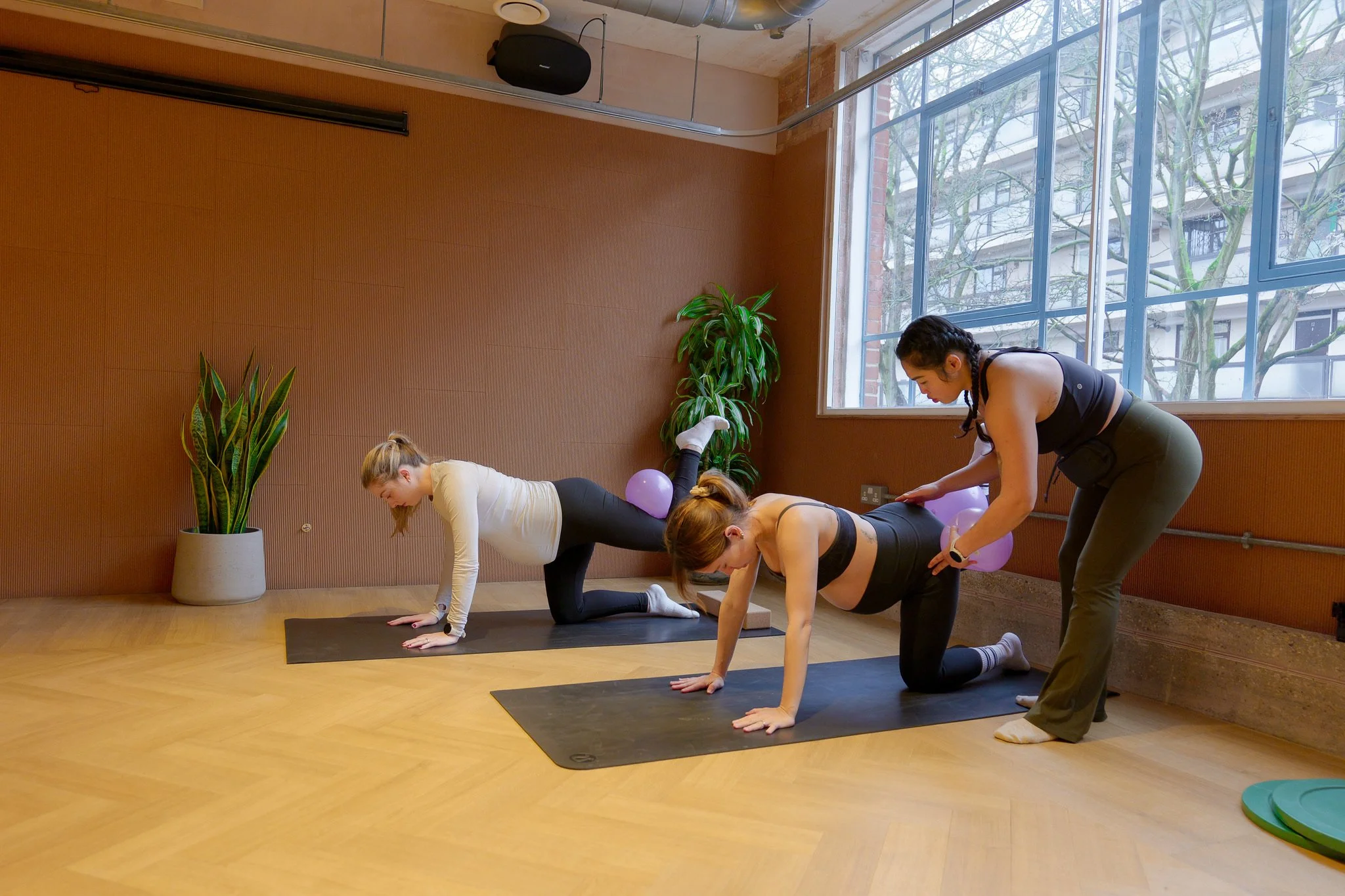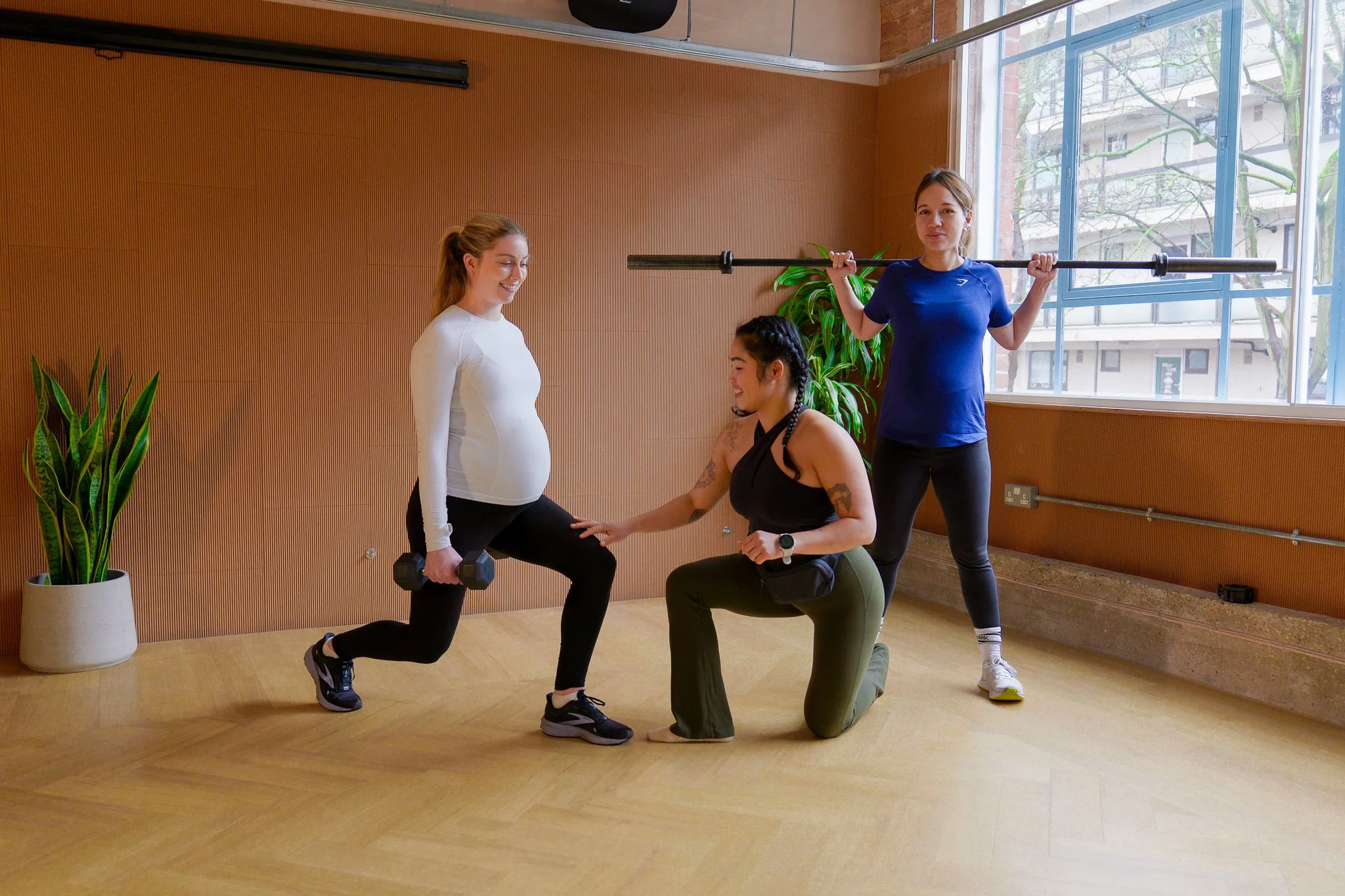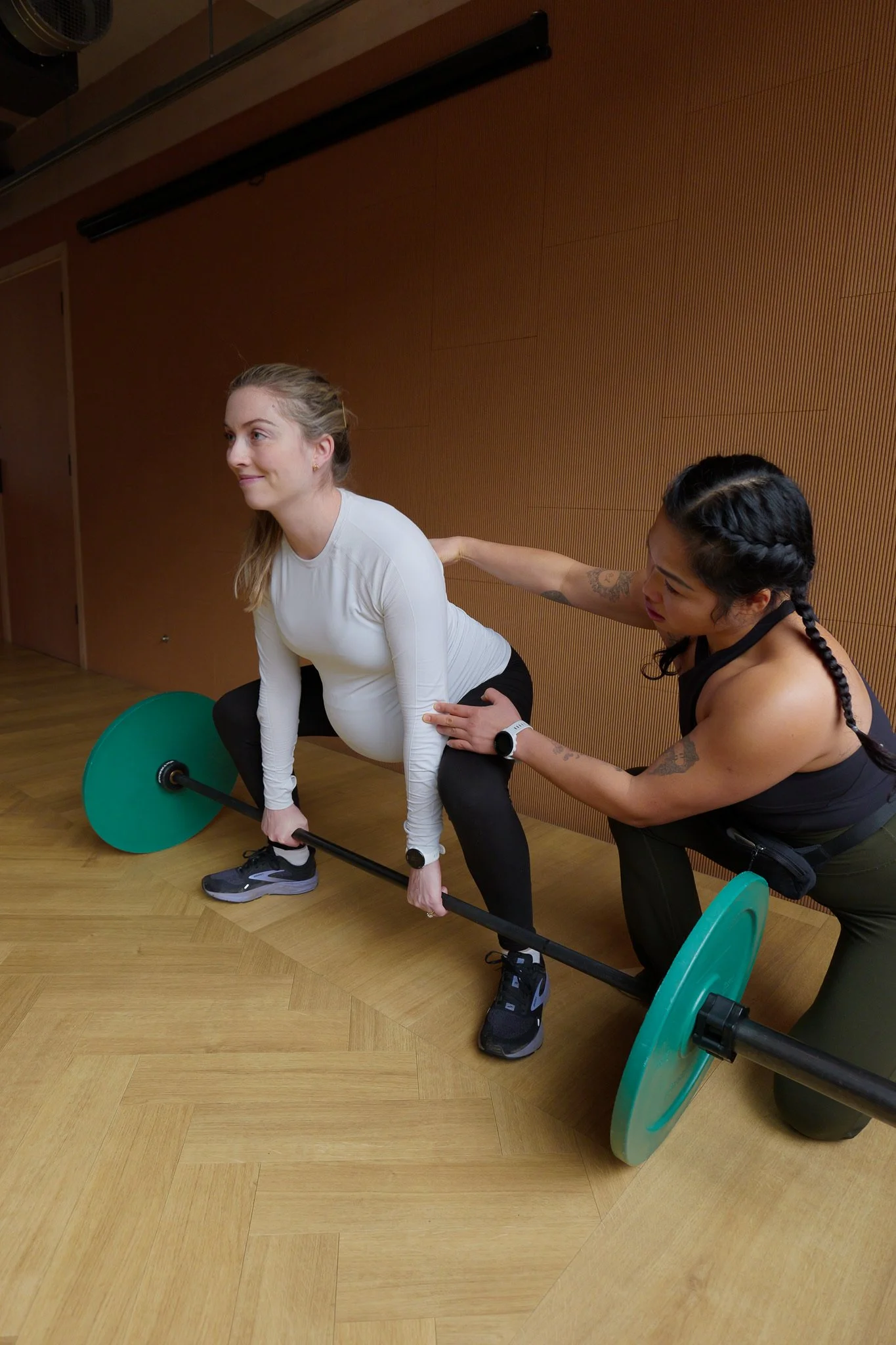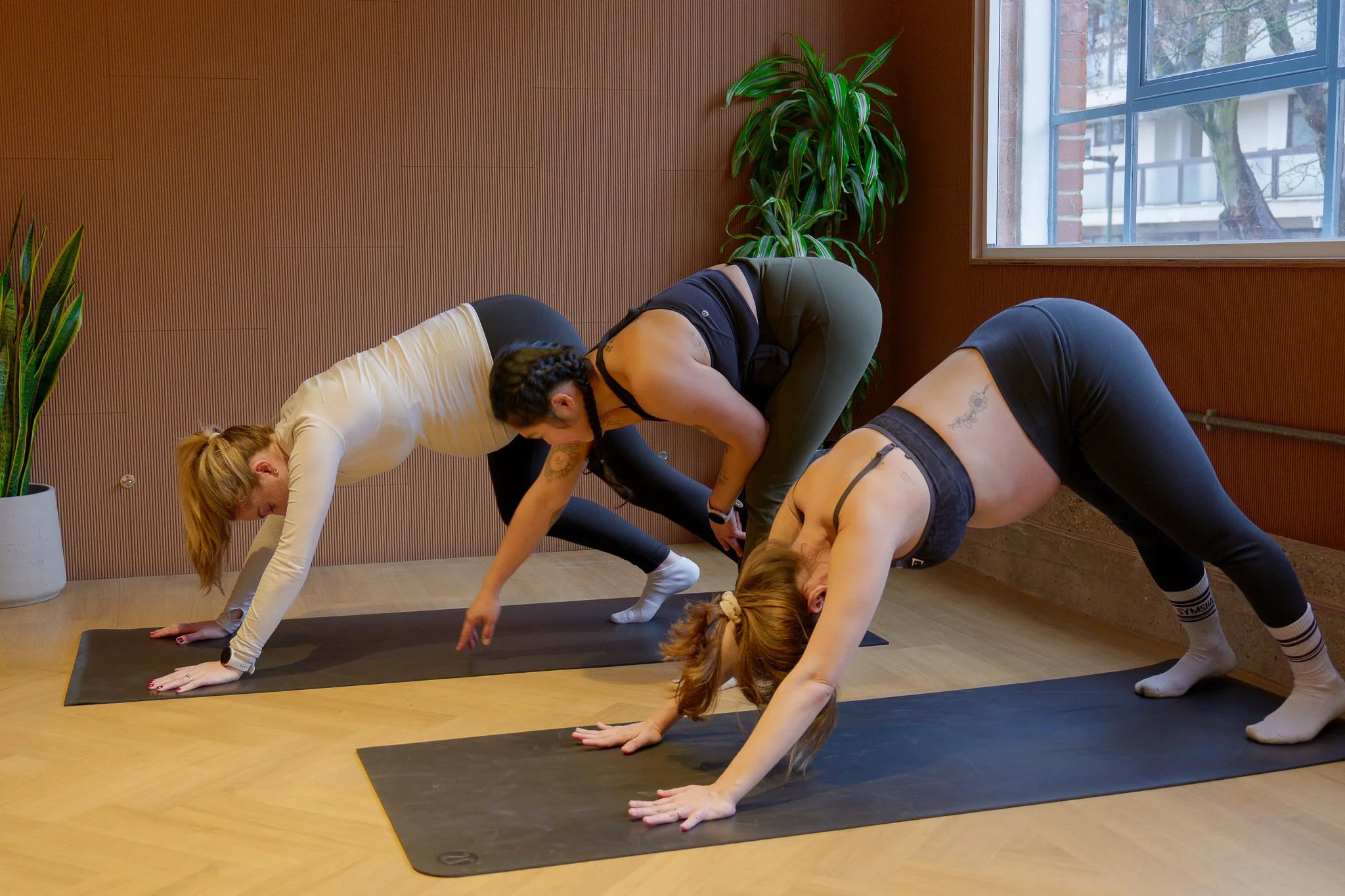
Private 1-1 Pregnancy Personal Training in Islington
The strength to carry
Pregnancy Personal Trainer in London
Looking for a pregnancy trainer to help you stay strong while you're pregnant?
Follow prenatal fitness expert Trang as she and her team goes through her own pregnancy journey with you. Each customised training session in different phases is structured with exercises designed for your current stage in pregnancy, helping you feel confident while building a strong and powerful body that’s ready to take pregnancy in its stride.
Staying active through the different stages of pregnancy doesn’t just benefit fitness levels – it’s also an absolutely essential part of keeping your mental well-being in check, maintaining your energy, and paving the way towards a quick recovery when your little one arrives.
We realise you might not feel completely yourself as your body changes, but don’t worry – at Trang Fitness, you’ll have a dedicated personal trainer working with you at your pace in your own private studio space.
Approaching pregnancy or aiming to get your fitness back after pregnancy – you might want to explore our dedicated prenatal personal training or postnatal personal training pages.
As is always the case with Trang Fitness , you’re guaranteed a completely bespoke-to-you experience, world-class 1-1 pregnancy fitness coaching in impeccable private studio space, immaculate changing areas, and no membership fees – ever.
Personal Training and More for Pregnant Women
There’s more to Trang fitness than just personal training. Looking after your body throughout your pregnancy involves developing your fitness, making the right nutritional choices, getting the right amount of rest, and seeking out additional therapies if you find you develop aches and pains.
Perhaps you’d like some advice on the best way to eat as your pregnancy progresses. Or maybe you’d like to switch some of your sessions to focus on gentle therapy and movement rather than working out?
We’re here to help with whatever the pregnancy rollercoaster has in store for you.
Why should I work out during pregnancy?
REDUCE ACHES AND PAINS
-
Regular exercise during pregnancy can help maintain overall health and well-being. It can contribute to better cardiovascular fitness, increased muscular strength and endurance, improved flexibility, and better posture.
-
Pregnancy can often bring fatigue, but regular exercise can help boost energy levels and reduce feelings of tiredness. Engaging in moderate-intensity exercises can help combat pregnancy-related fatigue and promote a sense of vitality.
-
Physical activity stimulates the release of endorphins, which are known as "feel-good" hormones. Regular exercise during pregnancy can help reduce stress, anxiety, and symptoms of depression, promoting a more positive mood and improved mental well-being.
-
Pregnancy and childbirth require physical strength and stamina. By exercising regularly, pregnant women can strengthen their muscles, including the core and pelvic floor, which may help in labor, delivery, and postpartum recovery.
PREPARATION FOR LABOUR
-
Exercise can help alleviate common pregnancy discomforts such as back pain, swollen ankles, constipation, and bloating. Strengthening exercises can improve posture, which may help reduce back pain and enhance overall comfort during pregnancy.
-
Physical activity can enhance blood circulation, reducing the risk of swelling (edema) in the extremities. Regular movement can help minimize fluid retention and promote healthier blood flow throughout the body.
-
Staying active during pregnancy can help manage weight gain within healthy limits. It can also support a healthy metabolism and aid in postpartum weight loss.
-
Some studies suggest that women who exercise during pregnancy may experience shorter labor durations and have a higher likelihood of a vaginal delivery. Additionally, postpartum recovery may be smoother for those who maintain fitness during pregnancy.
HOW TO JOIN US ?
1:1 Personal Training
4:1 Lifting Ladies
READY TO BE A STRONG MAMA?
Pregnancy Strength Training Islington
Empower Yourself with tailor-made prenatal strength training workouts. Each customised workout is structured with exercises designed for your current stage in pregnancy, helping you feel confident while building a strong and powerful body that’s ready to take pregnancy in its stride.
What can I expect ?
-
During a prenatal training session, you can expect a focus on exercises and movements that are safe and beneficial for pregnant women from us.
We are here to help you stay healthy during your pregnancy as London's premier prenatal personal trainers. We will talk about your objectives for prenatal training as well as your preferences, worries, and concerns.
We will obtain a full medical history from you and take the time to determine your unique needs in terms of mobility, physical problems, and present levels of fitness. In this manner, we can be certain that the programme we design is the one that will serve you and your baby's needs the best.
-
The session will typically start with a warm-up period to increase blood flow, warm up the muscles, and prepare the body for exercise. This may include gentle cardiovascular activities, mobility exercises, or stretching.
-
Our Prenatal training often incorporates exercises that focus on improving muscular strength and endurance. These exercises are designed to target major muscle groups while considering the changes and limitations of pregnancy. Common exercises may include squats, lunges, modified push-ups, bicep curls, and shoulder presses. The intensity and weight used will be appropriate for the individual's fitness level and stage of pregnancy.
-
As pregnancy progresses, changes in the body's center of gravity and hormone levels can affect balance and stability.
Our Prenatal training sessions may incorporate exercises that challenge and improve balance to help prevent falls and maintain stability. This could involve exercises such as single-leg balances, modified yoga poses, or exercises using stability balls.
-
Stretching exercises, focusing on improving flexibility and relieving muscle tension, are commonly included in our prenatal training sessions.
Gentle stretches and movements that target tight areas, such as the hips, lower back, and shoulders, can help alleviate discomfort and promote relaxation.
-
The trainer will provide modifications and adaptations to exercises as needed to accommodate the changing needs of each trimester.
These modifications may involve adjusting the range of motion, providing additional support, or using modified equipment.
-
Prenatal training sessions may incorporate breathing exercises and relaxation techniques to promote stress reduction, mindfulness, and connection with the body and baby.
These techniques can help prepare you for labor and enhance overall well-being.
Guidelines for exercising healthily
while pregnant
-
In the first trimester, if you weren't actively weight training before your pregnancy, don't suddenly take up strenuous weights. Use slow and controlled movements to lift weights as pregnancy hormones cause joints to be loosened and can increase the risk of injury.
-
After sixteen weeks general advice is to avoid lifting weights while lying supine (on your back) as it can press on a major vein – the vena cava. Doing so could make you feel dizzy, lightheaded and could limit your baby's oxygen supply.
With this in mind – and as your pregnancy progresses into the second trimester – it might be best to take a seat to lift weights.
Standing for too long during a workout could cause blood to pool in your legs and make it more difficult to keep good posture as your bump will alter your centre of gravity.
-
We know you know your body is changing. You see it, you feel it, it's real. But does your routine know it?
Changing up your routine as your body changes is one of the most important things to do if you want to continue training safely.
Be careful with free weights at this stage as there's a chance you could accidentally knock your bump.
-
A strong, flexible pelvic floor is so important for all pregnant women as it can help prevent and treat:
bladder leaks
bowel leaks
pelvic organ prolapse, and;
improve sexual function
'National NICE – national institute for health and care excellence– guidelines recommend all pregnant women do daily pelvic floor squeezes,'
And having a strong pelvic floor, stretches into fitness too, helping safely strength train for longer and heavier without increasing their risk of pelvic floor problems.
'When lifting any weight, our core cylinder automatically has to engage,' . The pelvic floor is situated at the bottom of – and is the most important part of – our core. A strong one means a strong core which means you'll be able to lift heavier weights more safely.
How to do pelvic floor squeezes
Simply, you need to pretend you're stopping wind – you should feel a tightening and lifting sensation that begins at the back passage, adding that there should be no external signs from the outside that you're doing them. The rest of your body – stomach, legs and bum should all stay still.
How many pelvic floor squeezes to do
'Eight squeezes at least three times a day. But, ideally, these need to be short and long ones.
Short squeezes are where you squeeze and release immediately.
Long squeezes are where you squeeze and hold for 10-seconds before letting go.
If you feel like you're not fully releasing between each one – which, heads up, you need to do – take a deep breath in and out. That should release the tension.
-
A common thing to do when lifting weights is to hold our breath as we huff and puff the heavy things around. Short story: stop doing that.
Try to breathe normally and use the Talk Test – e.g. can you keep up a conversation while working out without feeling breathless – to make sure you're staying the right side of exertion.
-
This is a biggie – always work within your abilities, limits and comfort. Pregnancy is not the time to try to smash PBs. Sorry, but it's not. Instead, allowing yourself plenty of rest and time to recover
-
Felt your centre of gravity shift as the baby grows and your body changes? Thought so. This change in balance can make you less stable and unfortunately more likely to fall over.
With this in mind, Trang recommends not lifting any weight over your head or up from the floor, and, if you're in any doubt to slow down and consult your maternity team.
Frequently Asked Questions
-
Unless you have specific advice from your GP saying otherwise, exercising during pregnancy is perfectly safe. In fact, NHS guidelines say that staying active through pregnancy makes it easier for the body to adapt to its changing shape and weight – as well as helping to cope during labour.
Exercise can also result in improved circulation – as well as helping with healthy weight loss after childbirth. There are also countless studies that show exercise can result in more energy and less stress – all vital parts of being a new parent!
If you have specific concerns, you’re completely welcome to get in touch and talk to one of the Lifting ladies team. There’s absolutely no obligation to commit to personal training and your enquiry will be handled with the strictest of confidence.
Check out out blog on: “How to prevent and manage back pain during pregnancy”
-
There are two things to consider when looking for a good pregnancy personal training service near to you.
Firstly, you should consider the qualifications of the people you trust with health advice. We have personal trainers who are specifically qualified to support people before pregnancy, through pregnancy, and when recovering from pregnancy. Of course, this should never supersede medical advice – but a depth of understanding about what your body is going through is very important.
Secondly, you should find a service with the kind of environment that works for you. Some people like group classes or busy gyms – whereas others prefer the privacy and focus of 1-1 coaching in a private studio. There’s no right or wrong on this point – just what works for you.
If you’re looking for a pregnancy personal trainer, we’d recommend visiting and experiencing the trainers or studios that appeal to you. A consultation will usually be free – and it gives you a really good chance to decide if you like the coaches, feel comfortable in the environment, and feel confident in the qualifications and experience the individual or team possesses.
you can check out our coaches here
-
Yes. We have personal trainers with a specialist qualification in pre natal exercise and post natal training sessions. To complement this qualification, they also have extensive real-world experience working with fitness training clients through each trimester.
Rest assured, you’re in expert hands when our team put together an exercise programme to take you through pregnancy and beyond.
you can find out more about our coaches here
-
While we definitely encourage everyone to continue training before, during and after their pregnancy, to keep their body strong and healthy, it’s all about doing what feels right for you and your body.
Our trainers can help at every stage of pregnancy. Some of our pre and postnatal clients were already training with us and kept training, before, during and after their pregnancy. Others come to us when they find out they’re pregnant, for guidance on how to work out in a safe and effective way. We also meet women much later on in their journey, who are looking to get back into fitness after a break.
Check out our blog on “The importance of prenatal fitness’
-
We don’t. We realise that pregnancy group training can be a great social experience – but when it comes to exercising in a way that’s exactly right for you, there’s nothing that comes close to personal training.
Working with a personal trainer is the only way to make sure your workout is tailored to you and your exact needs. Constant observation and communication is an essential part of making sure your workout is right too – and that can be lost with group gym instructing.
check out out blog on “Addressing Common Fitness Myths and Misconceptions for Women”
-
Pregnancy comes with a set of challenges that lots of people get red-faced talking about! Aside from the fact that baby will often rest on your bladder, pregnancy and childbirth also take their toll on your pelvic floor muscles.
The result? Frankly – peeing might sometimes feel like it’s out of your control! If you have an accident or a near-miss in one of our private studios – we can assure you it won’t be the first time (and it definitely won’t be the last)
So, what happens if you pee? Honestly – nothing. We’ll clean up, laugh together, and carry on. Pregnancy is a magical experience – but with mums and dads on our team, we know it’s got its moments!






